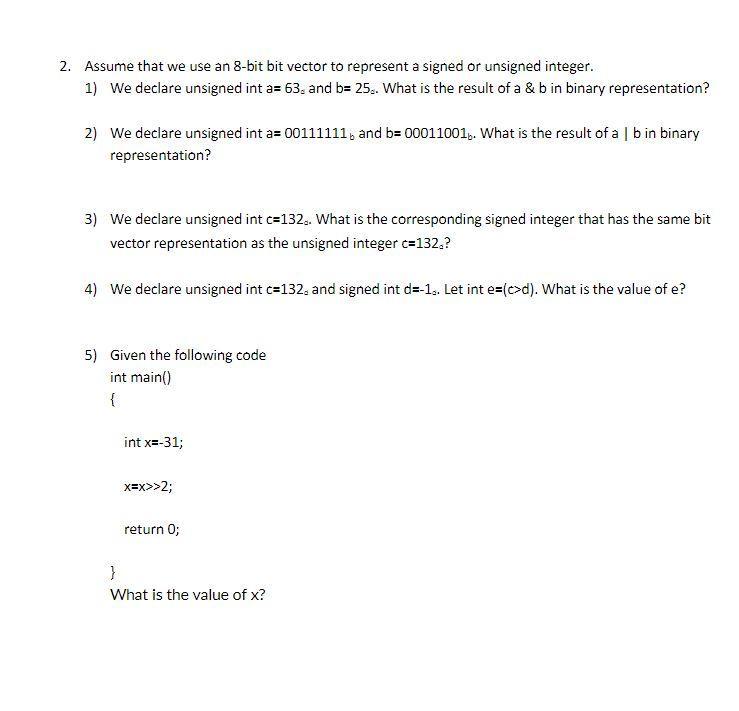Question
2. Assume that we use an 8-bit bit vector to represent a signed or unsigned integer. 1) We declare unsigned int a= 63, and

2. Assume that we use an 8-bit bit vector to represent a signed or unsigned integer. 1) We declare unsigned int a= 63, and b= 25.. What is the result of a & b in binary representation? 2) We declare unsigned int a= 00111111, and b= 00011001. What is the result of a | b in binary representation? 3) We declare unsigned int c=132.. What is the corresponding signed integer that has the same bit vector representation as the unsigned integer c=132,? 4) We declare unsigned int c=132, and signed int d=-1,. Let int e=(c>d). What is the value of e? 5) Given the following code int main() { } int x=-31; x=x>>2; return 0; What is the value of x?
Step by Step Solution
There are 3 Steps involved in it
Step: 1

Get Instant Access to Expert-Tailored Solutions
See step-by-step solutions with expert insights and AI powered tools for academic success
Step: 2

Step: 3

Ace Your Homework with AI
Get the answers you need in no time with our AI-driven, step-by-step assistance
Get StartedRecommended Textbook for
Income Tax Fundamentals 2013
Authors: Gerald E. Whittenburg, Martha Altus Buller, Steven L Gill
31st Edition
1111972516, 978-1285586618, 1285586611, 978-1285613109, 978-1111972516
Students also viewed these Programming questions
Question
Answered: 1 week ago
Question
Answered: 1 week ago
Question
Answered: 1 week ago
Question
Answered: 1 week ago
Question
Answered: 1 week ago
Question
Answered: 1 week ago
Question
Answered: 1 week ago
Question
Answered: 1 week ago
Question
Answered: 1 week ago
Question
Answered: 1 week ago
Question
Answered: 1 week ago
Question
Answered: 1 week ago
Question
Answered: 1 week ago
Question
Answered: 1 week ago
Question
Answered: 1 week ago
Question
Answered: 1 week ago
Question
Answered: 1 week ago
Question
Answered: 1 week ago
Question
Answered: 1 week ago
Question
Answered: 1 week ago
Question
Answered: 1 week ago
Question
Answered: 1 week ago
Question
Answered: 1 week ago
View Answer in SolutionInn App



